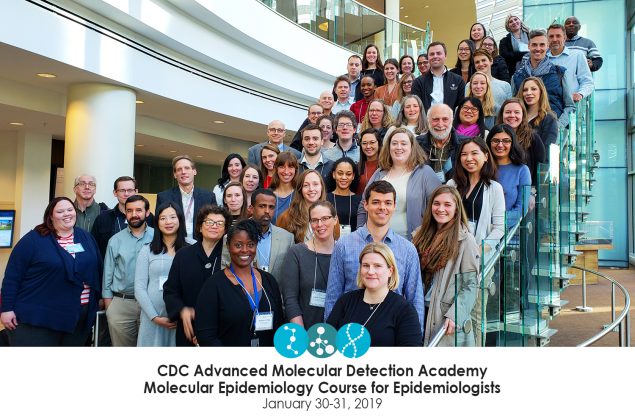2019: OAMD joins with CSTE and APHL to host AMD Academy

The Office of Advanced Molecular Detection (OAMD) welcomed epidemiologists and microbiologists from state and local health departments across the nation to the first AMD Academy, hosted with the Association of Public Health Laboratories (APHL) and the Council of State and Territorial Epidemiologists (CSTE). Held in Atlanta during the last week of January, OAMD presented a 2-day molecular epidemiology course for epidemiologists (January 30–31) and a 4-day, intermediate-level bioinformatics course for microbiologists (January 28–31).
AMD Academy is a new addition to the AMD portfolio and supports the program’s goal to expand workforce development opportunities. For the past few years, the AMD program has sponsored regional trainings for microbiologists, focused on basic microbial genomics. For epidemiologists, training is needed to review what AMD technologies can do and how to integrate it into their work. This year, OAMD developed the AMD Academy to meet two emerging needs: a demand for more advanced training among some microbiologists, and a growing interest in genomics among epidemiologists.
“With AMD capacity coming online now in a big way in state and local health departments, providing options for training is a big priority for us in the Office of AMD,” said OAMD Director Greg Armstrong, MD.
Attendees spoke highly of the instructors and appreciated the variety of backgrounds and resources they brought to the training. Timothy Jones, MD, of the Tennessee Department of Health, attended a previous 1-day version of the epidemiology course and was one of the voices who had asked for a more extended training that would go into more detail. “I’m a state epi, and it was a great level for me,” he said. “I work on a variety of subjects, and advanced laboratory techniques and associated informatics challenges are always coming up. We need to be increasingly familiar with WGS [whole genome sequencing].”
In the bioinformatics course, Matthew Sylvester, PhD, a research scientist with the California Department of Public Health, was impressed with how much he learned despite feeling that he came in with a pretty good knowledge of bioinformatics. He thought the last day, which focused on data visualization and collaboration, was particularly useful. “We are definitely thinking of how best to visualize data and integrate epidemiological information.” Sylvester continued, “There are a number of issues that need to be considered, but some of these tools seem like they could be great options for integrating metadata with sequencing data in a meaningful way.”
One of the Bioinformatics Regional Resource leads, Kevin Libuit, a scientist from Virginia’s public health laboratory, found the joint session to be particularly enlightening. “Speaking to the Mid-Atlantic epis drew my attention to the critical need for WGS and bioinformatics education for our epidemiologists,” said Libuit. “All of these technological advancements won’t do us any good if our epidemiologists aren’t properly trained on how to interpret and act on the results that laboratorians provide.” In his efforts to address this, Libuit is working with the epidemiologists he met at the joint session to develop WGS training and bioinformatics webinars specifically tailored to public health epidemiologists.
With another AMD Academy planned for May 2019, OAMD will be reviewing feedback from both attendees and instructors on how to improve the course. OAMD State and Local Outreach Lead Nathelia Barnes, DHSc, and APHL’s Christin Hanigan, PhD, organized the January event and will be working on the upcoming event in May. “The success of the inaugural AMD Academy courses highlights just how far we’ve come in building AMD capacity in state public health labs and health departments through workforce development,” Barnes said. “We hope to continue to offer dynamic and innovative AMD trainings to broaden the knowledge and skills of state public health professionals.”
